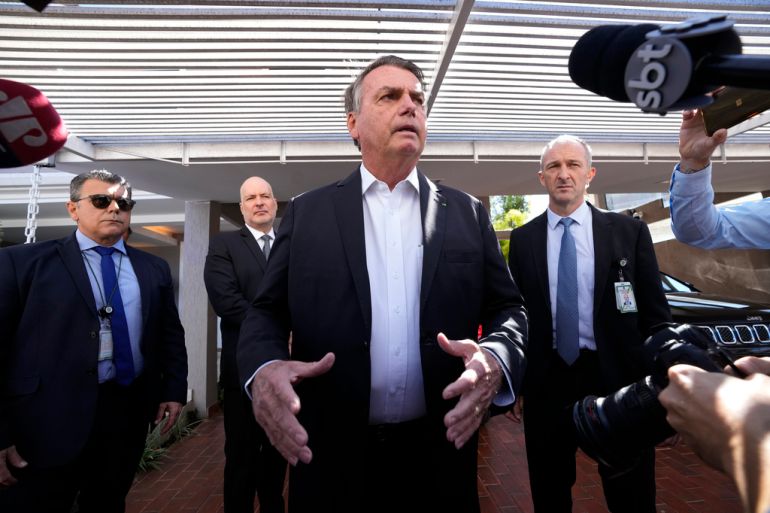Bolsonaro faces uncertain political future as Brazil trial starts
The former right-wing president is accused of spreading false claims about Brazil’s election system.

The political future of Brazil’s former President Jair Bolsonaro is up in the air as a trial kicks off in which he is accused of spreading distrust in the country’s electoral process.
The trial, which began in the capital of Brasilia on Thursday, could result in Bolsonaro being barred from holding public office for up to eight years if he is found guilty.
Keep reading
list of 3 itemsEx-Brazil President Bolsonaro appears before police in riot probe
Brazil’s Bolsonaro ordered to turn over gifted jewellery, guns
Al Jazeera correspondent Monica Yanakiew said that prosecutors are presenting evidence that Bolsonaro broadcast a meeting “in the middle of a campaign” to question the legitimacy of the election.
“It was broadcasted on national television. It went on all social media: Thousands of people heard that he was actually stating that the system — the voting system — could be rigged, the election results could be fraud,” Yanakiew explained live from Brasilia on Thursday.
“And he presented absolutely no evidence to back this up, so they’re accusing him of spreading fake news.”
The outcome of the trial could have a sizable impact on Brazilian politics by making the country’s best-known conservative politician ineligible for reelection.
Bolsonaro and his supporters have characterised the effort as politically motivated. In comments on his YouTube channel on Thursday, Bolsonaro said he wanted to remain “100-percent active” in politics and called the trial “an affront”.
His lawyer has vowed to appeal to the Supreme Court if Bolsonaro is convicted in the case.
Critics have pointed out that the former president has long embraced anti-democratic rhetoric and has tried to undermine support for free elections, making persistent false claims about the country’s voting system.
Those statements have fuelled protests against Bolsonaro’s defeat in the 2022 presidential elections. Bolsonaro was narrowly edged out by current President Luiz Inácio Lula da Silva in an October run-off, a result that some of his supporters refused to accept.
When Lula was inaugurated in January, a crowd of Bolsonaro supporters stormed government buildings in the nation’s capital in an ill-fated attempt to spur a military coup.
Lula accused Bolsonaro of planning the attempted coup, and a recent report by Brazil’s Federal Police suggests that one of Bolsonaro’s aides was involved in efforts to lay the groundwork for removing Lula from power.
Bolsonaro, who never officially conceded the race, has maintained his innocence.
He faces investigations over his alleged involvement in the efforts to overturn the election, as well as claims that he tried to illegally receive millions of dollars worth of jewellery from Saudi Arabia.
Thursday’s trial evaluates a case filed by the country’s Democratic Labor Party, specifically about the meeting Bolsonaro broadcast and the election-fraud claims the former president made while it aired.
The meeting, held with foreign ambassadors, was held on July 18.
The court’s first session began with Judge Benedito Goncalves reading his report on the case. The trial is being overseen by a panel of judges drawn from Brazil’s two top courts, the Supreme Court and the Superior Court of Justice, as well as two appointees.
“The evidence against him is very robust,” Rodrigo Prando, a political science professor at Mackenzie University in Sao Paulo, told The Associated Press. “Bolsonaro speaks in live broadcasts, on Twitter. I never saw anyone provide so much material against himself as Bolsonaro did.”
However, even if Bolsonaro is barred from seeking the presidency, Brazil’s conservative movement has demonstrated that it will likely continue as a formidable political force with or without him.
In the most recent elections, Bolsonaro lost to Lula, but his right-wing Liberal Party became the largest in both houses of Brazil’s Congress.